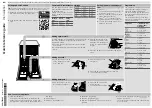
21
EN
Wash-cycle data is measured under laboratory conditions according to European Standard EN 50242.
Based on the different conditions of use, the wash-cycle duration and data can change.
The number and type of wash cycles and options may vary depending on the dishwasher model.
Wash cycles
Instructions on wash-cycle selection and detergent dosage
1.
The ECO wash cycle is the standard cycle to which the energy label data refers. It can be used to wash crockery with a normal
soil level and is the most efficient cycle in terms of energy and water consumption for this type of crockery.
4 gr/ml**+ 21 gr/ml – 1 Tab
(**Quantity of pre-washing detergent)
2.
Heavily soiled dishes and pans (not to be used for delicate items). 25 gr/ml – 1 Tab
3.
Normally soiled pans and dishes. 4 gr/ml**+ 21 gr/ml – 1 Tab
4.
Limited quantity of daily soiling (ideal for 4 place settings) 25 gr/ml – 1 Tab
5.
Cycle for delicate items, which are more sensitive to high temperatures 25 gr/ml – 1 Tab
6.
Fast cycle to be used for slightly dirty dishes (ideal for 2 place settings) 21 gr/ml – 1 Tab
7.
Pre-wash while awaiting completion of the load with the dishes from the next meal. No detergent.
Standby consumption: Left-on mode consumption: 5 W - Off mode consumption: 0.5 W.
Wash cycle
Wash cycle
which
include
drying
Options
Approximate
duration of wash
cycles
h:min.
Water
consumption
(l/cycle)
Energy
consumption
(KWh/cycle)
1. Eco
Yes
Delayed start –
Half Load - Tabs
03:00’
10
0,83
2. Intensive
Yes
Delayed start –
Half Load - Tabs
02:30’
14
1,3
3. Normal
Yes
Delayed start –
Half Load - Tabs
02:00’
13,5
1,1
4. Daily
No
Delayed start –
Half Load - Tabs
01:00’
10,5
0,95
5. Delicates
Yes
Delayed start –
Half Load - Tabs
01:40’
10
0,95
6. Rapid
No
Delayed start – Tabs
00:25’
8,5
0,5
7. Prewash
No
Delayed start –
Half Load
00:10’
4,0
0,01
















































